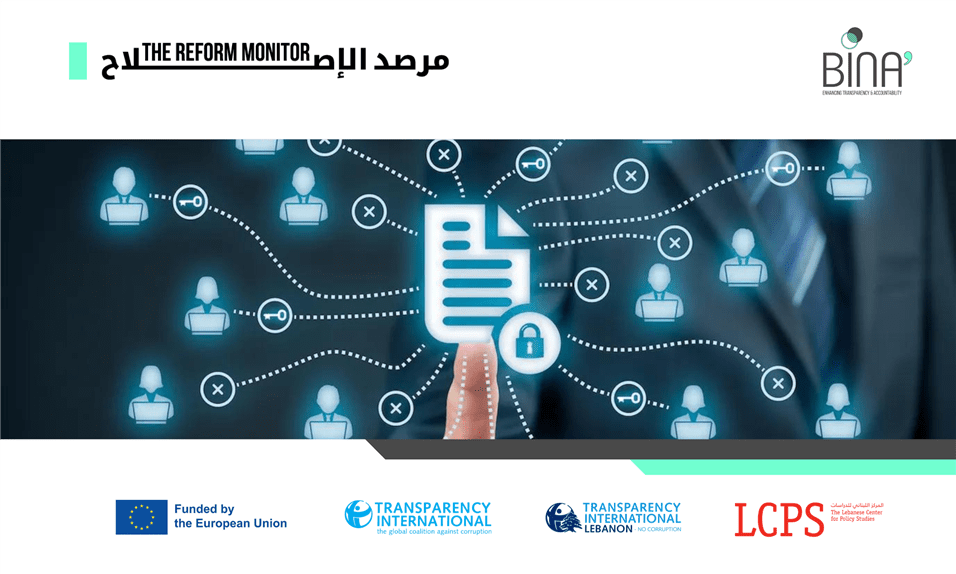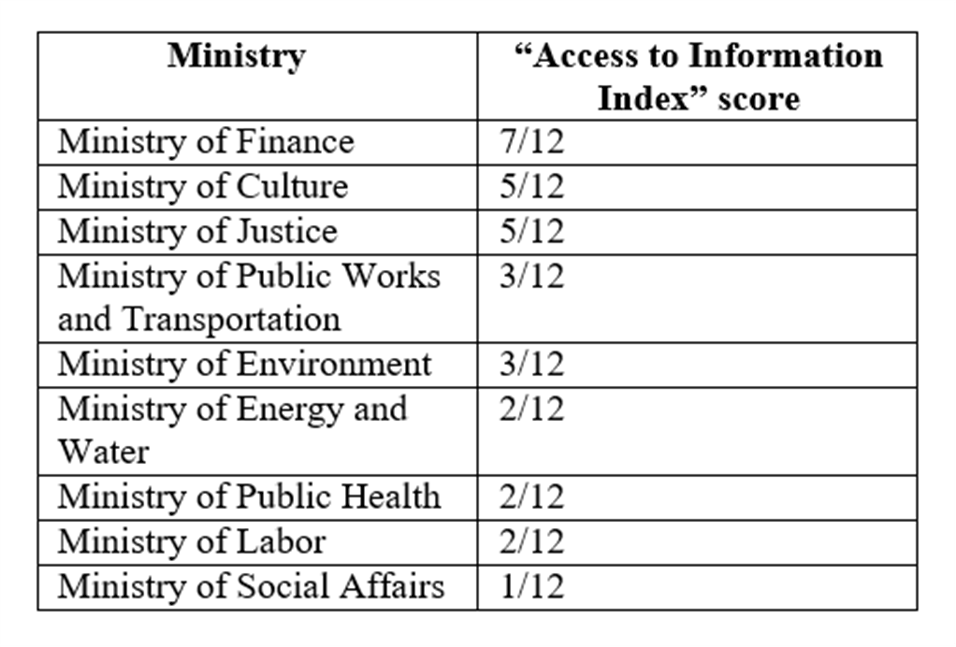-
Social IssuesDec 01, 2023
Access to Information in Lebanon: The Law and Its Implementation
- Christelle Barakat, Clara Diba

As part of its advocacy efforts towards building a people-centered and sustainable recovery from the Beirut port explosion and its endeavors to promote inclusive and equitable social justice, as well as foster trust between individuals, entities, and the Lebanese government, the Lebanese Center for Policy Studies (LCPS) partnered with Transparency International (TI) and its local chapter, Transparency International Lebanon – No Corruption, to issue “The Reform Monitor.” The topics covered by the monitor are linked to the areas of reform, recovery, and reconstruction (3RF). The monitor falls within the Building Integrity and National Accountability in Lebanon (BINA’) project, which is funded by the European Union. At the end of December 2022, the overall framework was reviewed for evaluation and adaptation purposes based on the closeout of the first phase, with foreseen updates underway. The views expressed in the monitor do not necessarily reflect those of the donor.
WHAT’S THE ISSUE AT HAND?
The topic of access to information has been at the forefront of Lebanese civil society’s agenda since the turn of the millennium. In 2001, the Office of the Minister of State for Administrative Reform (OMSAR) began the process of drafting a law in this regard. In 2005, there were renewed demands for the adoption of such a law, particularly from anti-corruption activists and organizations. Then, after Lebanon ratified the United Nations Convention Against Corruption (UNCAC) in 2009, additional pressure mounted to pass an access to information law.
However, it was not until 2017 that the Lebanese Parliament finally passed the Right to Access to Information Law. This law is binding on state administrations, obliging them to publish the majority of their documents, including their budgets, decisions, and documents detailing their activities. It allows any individual to request access to documents from state offices, public institutions, or private entities, either online or through a designated Information Officer at each of these entities. While this was a positive step toward more transparency and accountability, the law continued to give rise to several challenges that made the process of access to information arduous, bureaucratic, slow, and inefficient.
Indeed, the Global Right to Information Rating ranked this Lebanese law as “relatively weak overall,” mainly due to its “limited obligations to assist [information] requesters, no obligation to transfer requests which arrive at the wrong public authority or to respond as soon as possible, and strict limitation on the re-use of the requested information” (Global Right to Information Rating, 2017).
In 2020, the Ministerial Anti-Corruption Committee adopted a national action plan to overcome these issues and facilitate the law’s implementation. In 2021, Law 233 amended the Access to Information Law of 2017, following lobbying efforts from local civil society organizations. A key amendment relates to Article 1, which no longer asks information requesters to specify their capacity or to have an official title and an interest in the request being made and how the acquired information will be used. It contributes to speeding up the process of access to information.
Another amendment allows for the inclusion of religious courts previously untouched by the law. A third important change rejects public entities’ refusal to answer received requests under the guise of lack of information, particularly if the inquiry falls within the scope of work of a specific institution. Additionally, institutions receiving an Access to Information request cannot refer it to other actors or institutions; they have the duty to respond to it. Requesters can also receive the information that they are asking for in an electronic format, free of charge. A further important change was tied to the legal proceedings related to Access to Information, with the process removing the need for lawyers and becoming less costly for individuals.[1]
Transparency International Lebanon – No Corruption’s “Access to Information Index” points to the poor performance of several ministries according to the type and availability of information on each ministry’s website. The index assesses performance according to six categories. Ministries can score up to two points per category, for a total of 12 points on the index. If a ministry scores two points in a certain category, this means that the ministry is “fully compliant” with that category. Similarly, one point within a category means that it is “partially compliant,” and zero points mean that it is “fully non-compliant.” The table below reflects the “Access to Information Index” scores of nine Lebanese ministries.
[1] The comparative chart (p. 78-81) in the Arabic version of the “National Action Plan to Implement the Right to Access to Information Law” (2021) by OMSAR, UNDP, and OECD shows all of the amendments between the Access to Information Law of 2017 and its updated version in 2021.

While there has been increased adherence to the law, it has yet to be fully implemented. Today, challenges persist even with the 2021 amendments to the law. This monitor aims to shed light on obstacles that stand in the way of the Access to Information Law’s full implementation. It also underlines this law’s importance for transparent and accountable recovery, reform, and reconstruction. These mechanisms are tied to the structural reforms requested by the international community to provide economic aid to Lebanon.

Challenges Tied to the Access to Information Law and Its Implementation
The following challenges represent key obstacles that stand in the way of the full implementation of the Access to Information Law in Lebanon.
The National Anti-Corruption Commission and the Judiciary
The 2020 National Anti-Corruption Commission (NACC) and the judiciary play vital roles in the implementation and oversight of the Access to Information Law. The NACC is tasked with receiving non-compliance complaints and investigating them. The judiciary complements the NACC’s work by ruling on cases of non-compliance. They must both be empowered to carry out their roles, particularly in light of the overlapping crises that have impacted their human and financial capacities. Their independence must be preserved as well to ensure that transparency is the norm rather than the exception.
Implementing the Law at the Local and Municipal Level
At the local and municipal levels, especially in remote or underserved areas, staff or financial capacity may not be available to implement the provisions of the law. This difficulty is found at all levels within public administrations, but it is more felt in localities. For example, municipal employees may lack the technical know-how in terms of publishing documents online, or may not have adequate resources, such as servers and computers. These challenges are further complicated by limited or reduced funding, as well as lack of electricity, high fuel costs to keep generators and servers running, and rising public distrust. Some institutions may not even have a website.
(Un)timely Response to Requests
Public institutions are given 15 days to respond to access to information requests. Often, this deadline is not respected, likely due to the ongoing crisis and related strikes, not to mention the lack of a designated employee to handle requests in many offices. In 2022, the Gherbal Initiative sent requests for information to 204 public offices. Only 108 responded to the request—28 adequately and fully answered the request, and 80 gave incomplete responses.
Additionally, OMSAR and the Lebanese Parliament, two key institutions that drafted and passed the law, have failed to fully comply. OMSAR has only disclosed information pertaining to 10 out of 20 years, while the Lebanese Parliament has not answered access to information requests. In 2018, the Ministry of State for Anti-Corruption Affairs cited the lack of a budget as a reason for its inability to provide declassified documents (El Masri, 2019).
Acknowledging the Receipt of a Request
Some offices refuse to provide the information requester with an acknowledgment that they have received a request, usually a number from that institution’s register. It is an important part of the process, as it allows the requester to lodge a complaint before the National Anti-Corruption Commission or the State Council in case of non-compliance. Without the registration number, the requester does not have legal proof that they made an access to information request.Lack of Digitized Records
Many government offices, particularly at the local level, retain paper records and have not digitized their processes. This is an important challenge, as it leads to delays in responding to freedom of information requests and overwhelms already understaffed institutions. This is further compounded by the lack of human, financial, technological, and technical resources to digitize records.
Lack of Citizen Awareness
The majority of Lebanese are unaware of the importance of information and the right to access it. This is exacerbated by disinterest, hopelessness, or lack of civic education (El Masri, 2019). Furthermore, limited levels of outreach have only made matters worse. In some cases, even public employees themselves were unaware of their duties under the law (Chehayeb, 2021).
WHY IS THIS IMPORTANT?
It is essential to strengthen the implementation of the Access to Information Law for several reasons. Firstly, if properly implemented, this law can radically and positively impact civil society organizations and individuals’ knowledge about the work of state institutions. Secondly, in addition to fostering more transparency, it increases accountability and helps combat corruption. Thirdly, it allows the building of public policies based on evidence and numbers, and ensures proper monitoring and evaluation.
The right of access to information also related to the International Covenant on Civil and Political Rights (ICCPR) and the UN Declaration of Human Rights (UNDHR), which Lebanon has also ratified. According to Article 19 of the UNDHR, the right of access to information falls under the right of freedom of expression, which includes “seeking, receiving, and imparting information and ideas through any media and regardless of frontiers.” It also pertains to the right to information guaranteed in the ICCPR, mandating governments to proactively share information related to public interest.
Finally, increased transparency could help improve the level of trust between the Lebanese state and its citizens. This is important, especially at a time when public trust is low due to the concurrent and overlapping crises. These have affected the economy and banking sector and significantly disrupted the work of public institutions.
References:
Global Right to Information Rating. (2017). Country Data: Lebanon. Right to Information Rating.
Universal Declaration of Human Rights. (1948) United Nations.
Christelle Barakat is a researcher at the Lebanese Center for Policy Studies. She is a recent Lebanese Fulbright Foreign Student program graduate from the University of North Carolina at Greensboro, holding an MA in Peace and Conflict Studies with a concentration on International Peace Development. She completed her BA in Political Science and International Affairs with high distinction from the Lebanese American University. Her areas of interest include conflict analysis and resolution, disarmament, globalization, migration and refugee studies, and women and gender studies.Clara Diba is a Lebanese writer, student, and activist currently pursuing a master's degree in Globalization and Development Studies at Maastricht University.